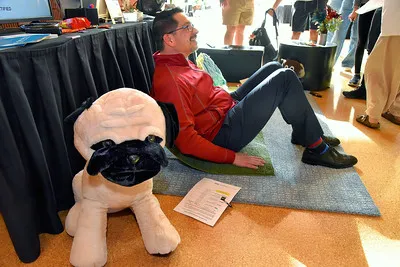
News
Welcome to Tauber Institute for Global Operations News.
Explore our press releases, feature articles, and announcements about Tauber students, speakers, team projects, and events.

Welcome to Tauber Institute for Global Operations News.
Explore our press releases, feature articles, and announcements about Tauber students, speakers, team projects, and events.

Ann Arbor, MI – In the Fall of 2023, the Tauber Institute of Global Operations was pleased to welcome Sheldon Davis of the Stephen M. Ross School of Business as the new Integrated Product Development (IPD) course instructor.
IPD is an innovative course that has been featured on CNN and written in the New York Times, Wall Street Journal and Businessweek. The course is hosted by the Tauber Institute for Global Operations at the University of Michigan and is taught jointly by faculty members Sheldon Davis and Professor Stephanie Tharp from the Penny W. Stamps School of Art & Design.
In this course, each team acts as an independent firm in competition with other teams (firms). The instructors announce a product development challenge. Usually composed of a product class, and target customer segment, each team must identify a valuable customer problem, and design and build a fully functional product within that class. The product class is broad enough to allow various design solutions.
Given the product class, each team must work through market research, concept generation and selection, technical development, production process design, pricing, inventory stocking, and advertising. Teams must design, build, and compete with a real, fully functional, customer-ready product. Teams compete with their products through two channels. The first is a web-based "trade show" where teams promote their products via student-designed websites, and people from around the world log into the IPD trade show to vote. A team's market share (and sales revenues) is computed from the share of total votes it gets nationally. The second is a physical trade show. Here, community members are invited to view the physical products, listen to teams' promotions, and vote for their favorites. Again, market shares and revenues are computed based on these votes.
The Tauber Institute had the opportunity to talk with Sheldon about his experience, the IPD course, and his vision for his students and the future. Or, watch the interview here >
Q: Can you tell us about your background? What road led you to the University of Michigan to teach the IPD course?
Sheldon: I have had the privilege over the last 25 years of leading R&D groups developing products for various value chains and companies, from new materials to consumer products that will one day be in your home. My career has been heavily involved in understanding customers and the engineering work required to launch products, even sometimes developing new processes. My history with this class was a fantastic experience. A panel of industry experts provides critique and guidance times a year, I participated for 6 years. When there was a need for a new instructor, I volunteered, and I’m very excited to be doing this class now.
Q: Let’s say I enroll in your course. What can I expect from this class?
Sheldon: First of all, welcome to the class! You can expect a lot of fun. It is a class where you get to meet new people and work in new teams, and as you do this, you’ll gain a lot of new experience. This course gives a Challenge prompt and allows you to start investigating and understanding the user and customers. In the Fall of 2023, we’re looking at getting people outside and getting fit, so we’re developing products in that realm. As we do that, the team talks to customers and users to empathize and discover what kind of problems they face. Then, they come back and prototype. Teams get into labs, use additive manufacturing, and explore solutions. Once a solution is defined, the team develops and launches the product into a simulated market! Along the way, the team develops a business plan to understand if, and how they will make a profit. It is a great, competitive course that replicates the experience of developing and launching a new product in a small firm. It’s so rewarding and you will have lots of fun.

Q: What do you find most interesting about the course?
Sheldon: I don’t think we have enough time to discuss that.
The course is the best of what you’d expect to see in the real world. The class teams are composed of excellent people from the engineering, business, and design disciplines. They are striving to develop and launch a new product by understanding the customers. It is not easy and exactly what happens throughout your career. What is interesting about that is the students will learn all the lessons here right now that they need: how to collaborate, talk to each other, and think and get things done. Product Development is full of ups and downs, so the experience is excellent preparation.
Another interesting aspect of the class is the process. Developing products is never easy especially when creating something unique and differentiated. The class process provides a foundation set of frameworks and tools. It starts with a focus on the user and customers. When you understand the problem through the user’s eyes, it is possible to develop ideas, test, refine, and deliver a highly desirable solution that makes business sense. This course delivers the whole experience in just these 15 weeks.
However, the best part is working with the students. The students are amazing, the best of the best. I am privileged to watch teams come together, get a challenge that they’ve never seen before, and launch a great idea in 15 weeks. These ideas are often nearly ready for the market, or even ready for the market. It is so interesting to watch it happen and see those products come to life.

Q: What do you find most challenging about this course?
Sheldon: The course, overall, is intense. It has many challenging aspects but time is most challenging. The class is 15 weeks long sprint. The students must get a prompt, understand the user and their market, quickly generate ideas, and sell a product all in 15 weeks. They have to move quickly and simultaneously.
Q: How do you feel this course prepares students for industry and their future careers?
Sheldon: You come together and, probably for the first time, truly, deeply work in teams on something you’ve never done before. This gives you the tools of communication and working together with people who have entirely different ways of thinking. I have a former student from the University of Michigan who works with me right now. He said to me this class was the single most important class in preparing him for his everyday work life. And why is that? Because he’s currently working with engineers and business people every day as a designer trying to develop a product. Much of what he learned about coordinating with people, the process of making products, and how to define problems were encapsulated in this class. It truly prepared him.
You will also learn to focus on the problem and the user. Extreme user and customer focus are the keys to great product development. Once you understand their problems and you understand your customers, developing the product is easy to some extent.
Q: What are some advantages of working with different degree programs?
Sheldon: This course does a great job of preparing students for industry. The class has students from 4 different colleges across the University of Michigan. We have students from Ross School of Business, the College of Engineering, the School of Information, and STAMPS School of Art and Design. Bringing them together is so critical because when you start your career, you will have to work in teams together. You’ll find that you’re running into people who think differently, have different practices, and do things differently. This prepares you for the future.
Q: What are you looking forward to most in your first year?
Sheldon: There are so many things to look forward to. Personally, I think it’s the students and the products. The sprint creates such a constraint that we get great ideas that are either ready for the market or on the verge. It’s amazing to see the students, and now their ideas can come to life.
Q: What skills or key knowledge would you hope I walk away with after taking your course?
Sheldon: There are probably several things that each student from the various colleges can use tomorrow when they leave and enter the industry. Some of the top ones we hope for are an appreciation for human-centered design focus. Human-centered design guides you to understand the problem from your user and customer’s perspective. You get to know your customers well so you can deliver a great product. It enables you to market and message to them.
Another thing you’ll take away is an appreciation for the business of launching a successful product. Successful products are desirable, profitable, and feasible in the real world; The class helps a student learn tools and frameworks to achieve those conditions.
Lastly, they’ll understand what it takes to make a real tangible product. They learn the difficulty of physically making a product. They gain an understanding of what the cost will be, how to manufacture it, the details, and the care, that you have to put into realizing a product.
These are some of the top things you can learn and deploy tomorrow.
To learn more about the IPD course, including enrollment requirements, visit our website here.